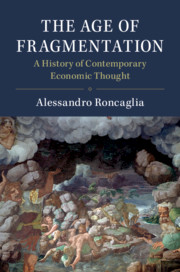Book contents
- The Age of Fragmentation
- The Age of Fragmentation
- Copyright page
- Contents
- Acknowledgements
- 1 Introduction: A Non-linear Discourse
- Part I The Background
- Part II The Giants of the Short Century
- Part III The Disgregation of the Mainstream
- Part IV The Weakening of the Paradigm
- 10 Behavioural Economics and Bounded Rationality
- 11 From Efficient Financial Markets to the Theory of Crises
- Part V Is a New Paradigm Possible?
- References
- Index
10 - Behavioural Economics and Bounded Rationality
from Part IV - The Weakening of the Paradigm
Published online by Cambridge University Press: 25 November 2019
- The Age of Fragmentation
- The Age of Fragmentation
- Copyright page
- Contents
- Acknowledgements
- 1 Introduction: A Non-linear Discourse
- Part I The Background
- Part II The Giants of the Short Century
- Part III The Disgregation of the Mainstream
- Part IV The Weakening of the Paradigm
- 10 Behavioural Economics and Bounded Rationality
- 11 From Efficient Financial Markets to the Theory of Crises
- Part V Is a New Paradigm Possible?
- References
- Index
Summary
In the framework of a critical illustration of the contemporary history of economics, this chapter provides an (original) illustration of Hayek’s thought: his formative years, his contributions to the theory of the trade cycle and the theory of capital and the subsequent debates with Sraffa and Kaldor, his theory of the spontaneous order and of the market as a mechanism of knowledge diffusion, his political individualism and the similarities to and differences from the notions of methodological individualism, liberism and liberalism, his thesis on the denationalization of money.
Keywords
- Type
- Chapter
- Information
- The Age of FragmentationA History of Contemporary Economic Thought, pp. 247 - 264Publisher: Cambridge University PressPrint publication year: 2019

